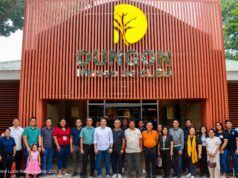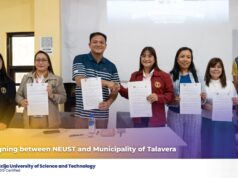CITY OF SAN FERNANDO — Breezing though the second half of the Luzon-wide enhanced community quarantine, the City Government of San Fernando is fine-tuning steps to make every Fernandino finally safe and protected from the coronavirus disease or Covid-19.
In a press statement released on March 31, 2020, Mayor Edwin “EdSa” Santiago remarked that the only wish of San Fernando is to end the disease while he strongly encouraged all sectors to “coordinate, collaborate, and help one another.”
“May nakalatag tayong mga aksyon. Gusto nating matapos na ito. Ito rin ang hiling ng ating national government at ng Department of Health – na huwag na itong umabot sa mas matagal pang panahon kaya ang panahon pong ito ay panahon ng kolaborasyon, kooperasyon, at pagtutulungan,” Santiago said.
The ECQ, which many are wont to call lockdown started on March 16, 2020 in the government’s efforts to stem the growing threats of COVID-19, and the challenges contained within it.
Now, the City is facing the second half of the ECQ and is continuously finding ways to tackle the challenges brought by the pandemic.
Upon the activation of its Emergency Operations Center, through the Incident Management Team, the City has been providing aid to the affected Fernandino communities in the aspect of health care, food and non-food assistance, and peace and order.
Food and non-food assistance subsidy
Aileen Villanueva, City Social Welfare and Development Officer and current team leader of TaskForce Kalinga, said that as of April 1, they have already provided food, non-food, and financial assistance and subsidy to more than 98,000 households.
According to Villanueva, priority beneficiaries included Persons Under Monitoring (PUMs), Persons Under Investigation (PUIs), urban poor, indigent families, and depressed barangays. Food packages were already distributed to more than 16,000 households while cash assistance reached 13,000 households.
More than 68,000 non-food items, including alcohol and face masks, were also given to all 35 villages, alongside medicines like paracetamol tables and syrups, and multivitamins.
Apart from these, following the declaration of ECQ, the City Government has provided more than P8.5 million-worth of aid to all the barangays, with each barangay receiving from P150,000 to P550,000 depending on their respective population.
Testing facility, testing kits
Among the City’s major plans is the creation of its own facility and acquisition of test kits. As of this writing, the City is expecting the arrival of the machine and test kits, and is coordinating with a hospital to perform the testing activities.
It was mentioned earlier by Dr. Renely Tungol, City Infectious Cluster Program Manager and the current Incident Commander of the Incident Management Team of EOC, that the City has adequate number of health personnel who will attend to the needs of the City as it is set to operate its own health care facilities for PUIs and the said testing facility.
Comprehensive case monitoring
The City Information and Communications Technology Office is also currently developing a citizen’s tracker digital mobile application which aims to aid and guide the City in monitoring and evaluatingthe number of PUMs and PUIs in every barangay.
CICT Officer Marthy Zapata said all barangay captains will be given access to the application once it is operational.
Stricter border control
With regards to peace and order, the City is implementing a stricter border control. According to Police Lt. Col. Paul Gamido, city police chief, only essential personnel and goods will be allowed to pass through the city’s borders.
Gamido explained that individuals coming from neighboring towns and cities are prohibited from entering San Fernando.
“This is one of the ways to apply physical distancing,” Gamido said.
Along with this is the plan of the City Engineer’s Office and Bureau of Fire Protection San Fernando to create sanitation equipment which will be used for vehicles passing by the city’s border control checkpoints to deliver essential goods.
The City is also looking for a possible installation of “Mobile Palengke” and provision of food stubs to every barangay so the movement of the people will be minimized.
Following directives, helping frontliners
Santiago reiterated the need for the community to follow all the directives given to them, citing that front liners—including barangay officials and medical personnel—are risking their lives while performingtheir responsibilities.
“Nakikita natin ang mga front liners na halos 24/7 silang nagtatrabaho. Kaya, sa ating mga kababayan, sumunod po tayo sa kanila. May mga bagay na hindi perpekto sa trabaho nila pero makiisa at tulungan po natin sila,” he said.





